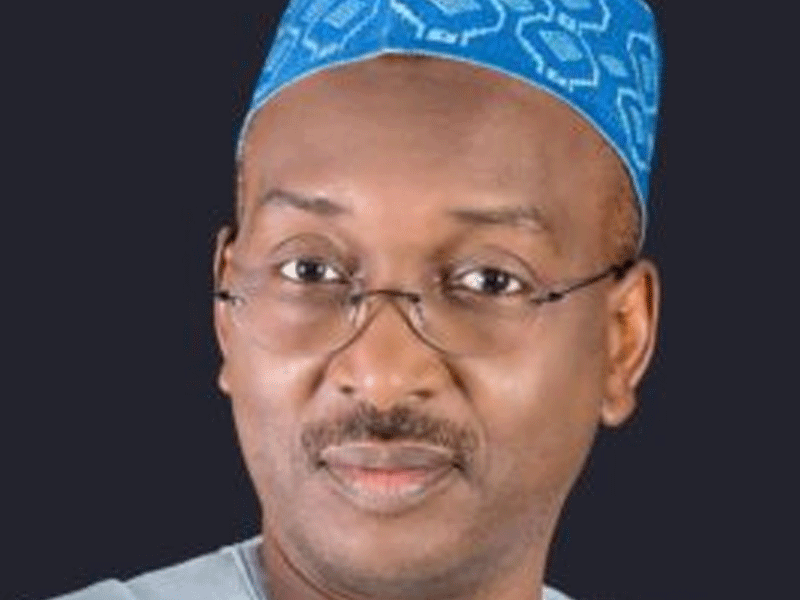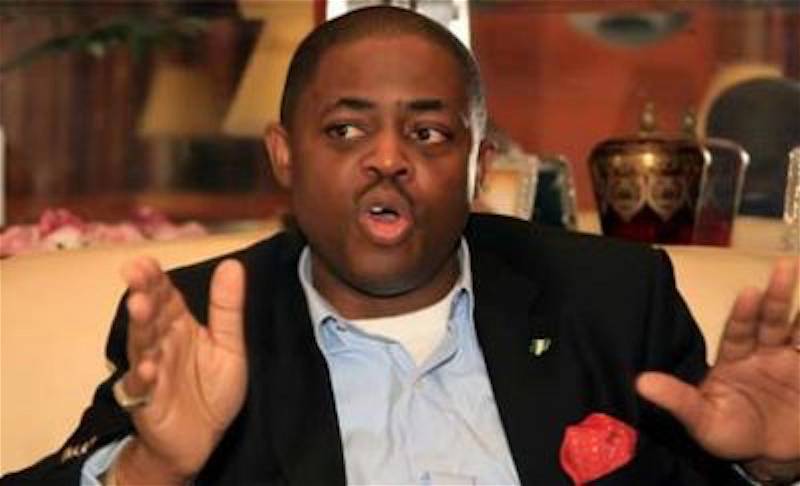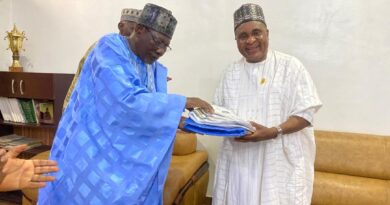APC Internal Dynamics and the Future of Democracy, By Salihu Moh. Lukman
This is dedicated to Sir F. N. Nwosu, APC National Welfare Secretary who died in the morning of Thursday, March 9, 2023. May his gentle soul rest in peace and may God Almighty grant the family and all of us his associates the fortitude to bear this heavy loss. In the hope that the piece will contribute to the development of APC as a progressive party under the leadership of Asiwaju Bola Ahmed Tinubu as President of the Federal Republic of Nigeria, which Sir Nwosu actively campaigned for, but unfortunately will not be alive to witness.
The emergence of the All Progressives Congress (APC) as the winner of the February 25, 2023 Presidential and National Assembly elections present another opportunity to respond to the challenges of uniting Nigerians across all divides. Given the divisive campaigns sponsored by opposition parties, especially around the Muslim-Muslim ticket of Asiwaju Bola Ahmed Tinubu and Sen. Kashim Shettima, now President-elect and Vice President-elect, APC need to demonstrate that the politics of uniting Nigerians require unconventional approaches, which goes beyond simple recognition of the dominant groups in Nigerian politics. Over the years, issues of representation in Nigeria were skewed in favour of the three major ethnic groups – Hausa/Fulanis, Yorubas and Igbos. Other groups were relegated to secondary players.
Associated with this reality is the lack of consideration for other factors that defined the identity of Nigerians, which include religion and gender. Of course, inbuild in all of these is the demographic factor of age. All these are taken for granted and conservatively assumed that once ethnic factors are considered, however skewedly defined, issues of religion, gender and demography are resolved with them. Whether consideration of ethnic factors alone marginalises other groups is hardly given consideration. Marginalised groups are left on their own to struggle for political survival.
Interestingly however, even within majority ethnic groups the other subsidiary identity factors of religion, which potentially debases citizens to status of marginalisation are hardly respected. For instance, the assumption that a Hausa/Fulani person is a Muslim, a Yoruba man is a Christian and an Igbo man is a Christian excludes anyone from such ethnic groups who does not fit into such categorisation. There are Hausa/Fulani people in the North who are Christians. There are many Yoruba people who are Muslims and there are some few Igbo people who are Muslims. Electoral politics constructed based on the old assumption of straight jacketed identity of Hausa/Fulani Muslim identity, Yoruba Christian identity and Igbo Christian identity may not guaranty electoral viability.
Beyond the challenge of electoral viability, it also risks mobilising strong opposition largely because it may have to alter political equation in favour of minorities within the major ethnic groups. In summary, this was the challenge, which the APC had to respond with the emergence of Asiwaju Tinubu as the Presidential candidate of the party for the 2023 Presidential election. The big question is whether the choice of a Muslim-Muslim ticket with Sen. Shettima as Asiwaju Tinubu running mate was deliberately designed to broaden the scope of political participation and representation in the country. While acknowledging that it may not have started as a deliberate plan to broaden political participation or representation, it will be important to recognise that it highlights the political ingenuity and capacity of Asiwaju Tinubu to courageously make a choice that deviate from conventional politics to win the support of citizens.
Being a Muslim within a majority Yoruba ethnic group who is interested in winning election, it must have been very clear to him that electoral attractiveness to the highly populated North would have to be sensitive to factors of religion in addition to ethnic factors. Of course, following the 1993 electoral template of Chief M. K. O. Abiola and Alh. Babagana Kingibe, with hard work electoral success could be achieved. No doubt, the choice of Muslim-Muslim ticket is a choice, which both the APC and Asiwaju Tinubu as the Presidential candidate of the party had to make as electoral strategy. Of course, the Peoples Democratic Party (PDP), Labour Party (LP) and the New Nigeria Peoples Party (NNPP) have throughout the campaign use the choice of the Muslim-Muslim ticket of the APC as a big campaign issue. They used it to mobilise Nigerians against the APC and all its candidates, especially Asiwaju Tinubu being the Presidential candidate.
Now that the election is won by APC and Asiwaju Tinubu, it is important to demonstrate that the Muslim-Muslim ticket of Asiwaju Tinubu and Sen. Shettima is simply an electoral strategy and indeed represent a progressive template for inclusion in Nigerian politics. For this to be achieved, APC and its leadership must not allow individual politics of personal aspiration by potential office holders to drive the process of constituting the next Federal Government to be led by Asiwaju Tinubu and Sen. Shettima as President and Vice President of the Federal Republic of Nigeria. Individual aspirations by potential office holders may only result in unmanageable contests for positions in the next Federal Government and could further complicate the challenges of inclusive politics in the country. Besides, unregulated contest was what produced the rebellious leadership of Sen. Bukola Saraki and Rt. Hon. Yakubu Dogara in the National Assembly in 2015.
APC must avoid past pitfalls and develop proactive strategy of producing a broadly inclusive government post May 29, 2023 under the leadership of Asiwaju Tinubu. For that to happen, first thing first, APC need to acknowledge the groundswell of grievances both within the party and the country and resolved to use the opportunity to setup the next Federal Government to address most of the challenges. It must be acknowledged that the process of producing candidates for 2023 elections itself created so many disputes within the party. In fact, since 2015, many disputes arising from internal party primary to produce candidates for elections have been snowballing and rolling into next electoral contests. Although under the leadership of President Muhammadu Buhari, these disputes were not allowed to undermine the electoral viability of the party, inability to resolve these internal disputes, combined with problems associated with guaranteeing inclusive politics in the country may destroy APC’s electoral viability in future elections.
While it is important to avoid witch-hunting individual leaders of the party for their role during the primary that produced candidates for 2023 elections, including those who supported or campaigned against Asiwaju Tinubu, it is important as a matter of strategy to broaden the scope of opportunity to rectify the outlook of the party and use it to also project the politics of an Asiwaju Tinubu led Federal Government as being inclusive. Also, learning from PDP’s mistake of insensitivity whereby the inability to align the outlook of the leadership of the party with the standard bearer of the party for the 2023 Presidential race, which became a source of deep-seated animosity among party leaders, it is important that APC, even before May 29, 2023 when Asiwaju will be sworn in as President of the Federal Republic of Nigeria, take every step to rectify any situation that may be used to continue divisive campaigns and propaganda against the APC and its control of Federal Government.
With a National Chairman, Sen. Abdullahi Adamu, who is also a Muslim, it will be important that every necessary step is taken to inject a change of leadership for the party so that a new National Chairman who is a Christian takes over. Part of the advantage of this is that the National Chairman could be retained in North-Central. Noting that the current National Chairman has done an excellent job to manage a successful campaign to win the 2023 election with all the attendant challenges, there should be no difficulty in convincing Sen. Adamu to resign as National Chairman to create opportunity for a new National Chairman of APC to emerge who is a Christian. For that to happen may require Emergency National Convention because if the hierarchy of the current leadership is to be followed, the successor to Sen. Adamu will be Sen. Abubakar Kyari who is a Muslim from North-East.
Apart from changing the National Chairman, there is the need to also recognise that the case of Sen. Iyiola Omisore, National Secretary of the party has become a source of stronger dispute in Osun State. Unfortunately, rather than serving as a unifying factor for the party leadership in Osun State, Sen. Omisore is more a divisive factor, which may have been responsible for why APC lost the 2022 Governorship election to a political mediocre whose only qualification in politics may appear to be comic dancing skill. To save Osun State and bring it back to its old standard of national political reckoning, Sen. Omisore would need to resign as National Secretary of APC, and a new unifying National Secretary elected. Beyond Sen. Omisore, similarly, any member of the National Working Committee of the party who is not a unifying leader in his/her state should be changed.
In addition, APC must take of the challenge of reconciling its members across the country. The recalibrated APC leadership with a new National Chairman must take up the challenge of reconciling members from every part of the country. APC must never make the mistake of proceeding with the task of constituting the Asiwaju led Federal Government based on business-as-usual strategy. The opportunity of constituting the Federal Government led by Asiwaju Tinubu must be used strategically to reconcile the APC with Nigerians. Every sacrifice must be made by every leader of the party to create the condition for an Asiwaju Tinubu led Federal Government to emerge with strong legitimacy and wider support base by Nigerians.
Therefore, side by side with the initiative to recalibrate the APC leadership is the need to properly plan the distribution of key positions in the Federal Government to reflect both ethnic, religious, gender and other demographic considerations. As a party, we must consciously avoid any mistake that could be used by our political adversaries to suggest insensitivity to the inclusion of all Nigerians. APC leadership must take steps to regulate the aspirations of individual leaders to positions in the next Federal Government. Some positions, for instance must be deliberately locked to sections and groups in the country.
Some specific recommendations may be necessary at this point. The offices of Senate President and Speaker House of Representatives would have to be locked. Given that the President and Vice President are from South-West and North-East respectively, nobody from either of these two regions should aspire for any of these offices. Opportunist may argue that in the last four years, the South-West also produced the Vice President and Speaker of House of Representatives. We must correct this kind of lop-sided reality as a strategic approach to dousing ethnic and religious tension in the country. With a National Chairman from the North-Central and hopefully a Christian, the North-Central too should also be excluded from aspiring for either the position of Senate President or Speaker of the House of Representatives.
Accordingly, the positions of Senate President and Speaker House of Representatives should be zoned to North-West, South-East or South-South. With a Muslim President and a Muslim Vice President, it is only logical to zone the Senate President who is the number three ranking leader of government to either the South-East or South-South who would be Christian. Logically, the position of Speaker of the House of Representatives should be zoned to the North-West. This would have the advantage of acknowledging that the North-West gave Asiwaju Tinubu the highest votes of 2,950,393 representing 33.6% of the votes he won. All other positions in government can be assigned by taking bearing from that.
While it may be important to consider including the position of Secretary to Government Federation (SGF) as part of positions to be zoned, Asiwaju Tinubu must avoid the mistake of undermining his government by appointing politicians with zero experience in managing public service institutions to serve as SGF. The office of SGF is in fact the brainbox of government and once a wrong person is appointed into such a position, the delivery capacity of government will be weak. Therefore, the choice of where the SGF will come from is as important as the qualification and public service experience of any person to be considered.
Achieving all these would require institutionalised consultations and negotiations involving structures of the party. Asiwaju Tinubu as the new leader of APC should challenge party leadership to make all structures of the party functional in line with provisions of the constitution of the party. A situation whereby key decisions including issues of zoning are handled outside the constitutional structures of the party is unhealthy, unsustainably, and challengeable. APC need to recognise that the Muslim-Muslim ticket it provided for the 2023 Presidential election, if not managed to produce desired outcome of inclusivity to broaden the foundation for wider participations of Nigerians in politics and governance across all divides, could further widen the division among Nigerians, which should be avoided. A successfully well-managed Muslim-Muslim would make a Christian-Christian ticket viably possible. For instance, if a Christian Northerner is to emerge as a candidate for a Presidential contest, the choice of a Southern Christian as running mate should be a viable consideration for a potential electoral victory.
Finally, President Muhammadu Buhari’s government for eight operated based on the philosophy of “I belong to everybody and I belong to nobody”. As a result, APC leaders and members had to leave with the reality of producing a government in which they have little or no influence. Many Federal Government appointees inherited from PDP were retained. For instance, Mr. Godwin Emefiele is one of the appointees of Federal Government inherited from PDP in 2015 but retained till the end of President Buhari’s tenure. Similarly, processes of appointments into government positions were handled without consulting party leaders. Consequently, many appointees of government were hardly accountable to the APC and its leadership. An Asiwaju Tinubu led Federal Government must avoid the mistakes of President Muhammadu Buhari administration while building on its strength.
Salihu Moh. Lukman
All Progressives Congress
North-West Zonal Office
Kaduna




